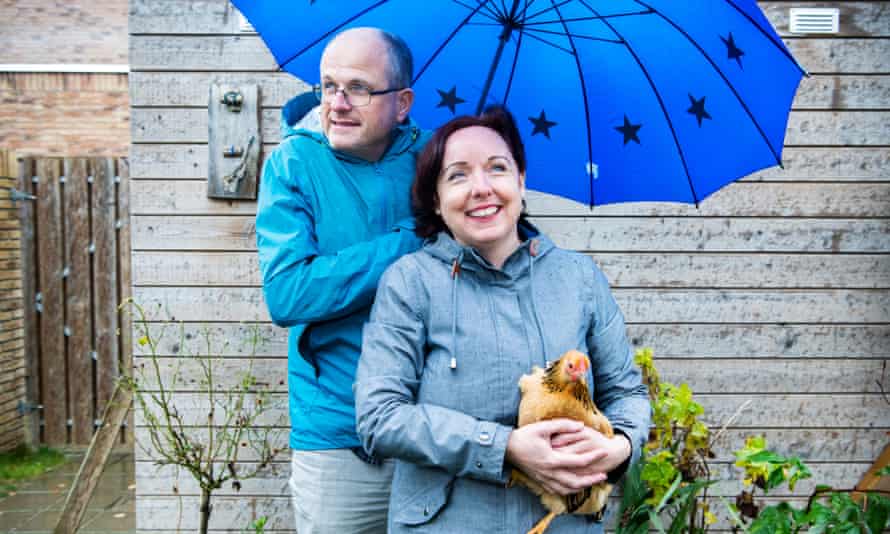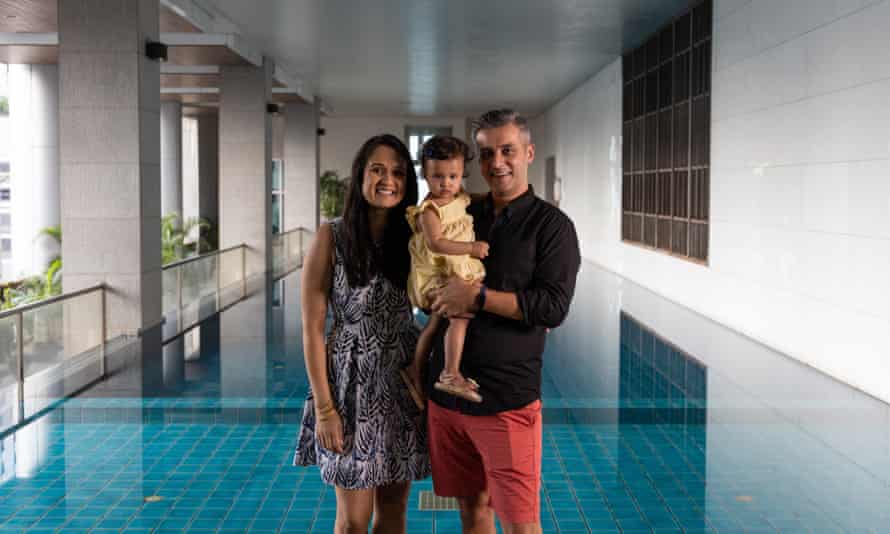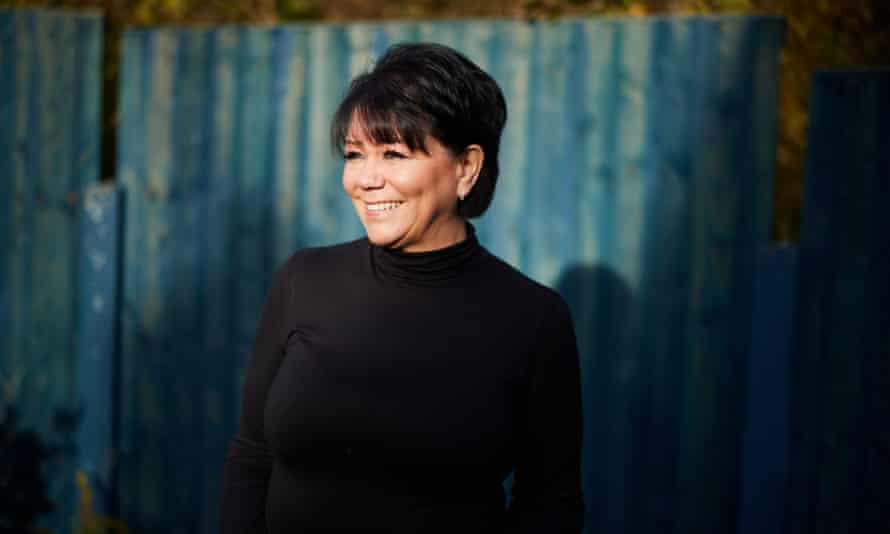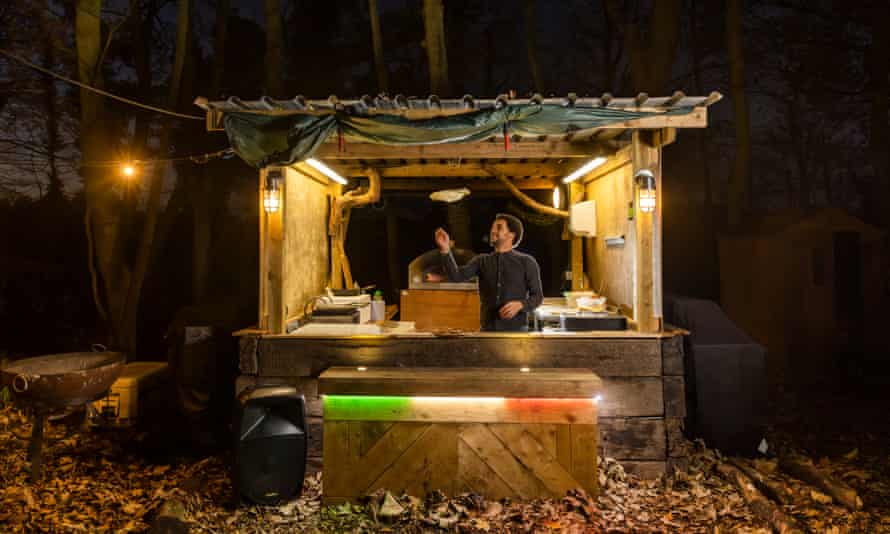
Life after a great leap: lessons from people who dropped everything in search of happiness
‘I bought 200 turkey chicks – and learned to rear them on the job’
Paul White, 35, Lancashire
In May 2018, I became leader of my local council, Pendle, in Lancashire. A year later, after nearly a decade in local politics, I quit. Alongside my council duties, I had been growing a business: milk and grocery delivery to 100,000 customers, locally and elsewhere in the country. I had a 3am milk round, so I’d be up before dawn delivering bottles, jumping on a train to Westminster after lunch to meet government ministers, and heading back to chair a council meeting that evening.
My heart was constantly racing. Shortly before my election as leader, I’d been diagnosed with cardiomyopathy – heart failure. I’d been fitted with a pacemaker and defibrillator, and put on medication, but I’d torn up the doctor’s note, convinced I was too busy to take time off. I wasn’t bothered if my demanding life killed me. I was single and had no time for a family.
After one 21-hour work day, towards the end of 2018, I told my mum I planned to quit; as soon as I uttered the words, I felt the weight lift. I moved to a barn conversion in Laneshawbridge, the Lancashire village I grew up in, and sold my stake in the business. For a while, I did nothing, which was an enormous and uncomfortable culture shift. Then I remembered dreams I’d harboured as a kid, when I’d draw maps of farms I wanted to own. I had studied rural enterprise at university, but the idea of working in agriculture got lost in business and politics. I’d kept an eye on the farming press and, in early 2021, still reeling from the pandemic, I spotted warnings of a turkey shortage at Christmas – a result of supply chain and labour issues stemming from Brexit.
I rented an acre of woodland in the village, bought 200 turkey chicks for £2,000, and read up on how to rear them. I set up the business in three weeks, figuring I’d see a return in 20 weeks, when the local pubs and butchers were ready for their birds.
Each day, I get up with my turkeys at dawn and close them in at dusk. I work alone, but I’ve learned a lot, educating myself on the job – the weird ways the turkeys react to noise, how much they eat, and how loud they are; farming with a hangover is a nightmare. I’ve rented 11 more acres and, this year, I’ll start a commercial flock of egg-laying chickens, then move on to sheep.
When I was in politics, I thought it was the most important thing in the world. I was named Young Lancastrian of the Year in 2018, but, when I look back at photos, I seem grey, thin, ill. Now, I spend hours outdoors. I lead a walking group, and clock up even more miles with my dog. I tend to my turkeys by the river, and potter around the village talking to people. Before, my family were neglected. Now, my mum pops in for a brew after work, and I spend time with my baby niece.
Practically, there are downsides to life on the farm: rain, animals die, and you have to be very smart to make a living from it: a £10 turkey chick can eventually sell for up to £90. Emotionally, it’s been hard to come to terms with the change. Handing over the keys to the town hall was a huge relief, yet I toy daily with going back – it feels like unfinished business. People who wanted my attention for years, whom I considered friends, disappeared. I’ve also found it hard to reconcile myself with the idea that I’m not contributing to the world or achieving in the same way: once you’ve tasted success, you feel compelled to fill your days with it. Now, I question if it’s OK for life to feel this simple. I suspect I will look for another endeavour alongside this one, but it will have to be just right.
Everyone tells me how lucky I am to have made the leap. It is never going to make me rich in money but I think, in time, it could make me rich in happiness.
‘After the Brexit referendum, my Dutch husband said: we have to move’
Dawn Connor-Van der Horst, 49, Nijmegen, the Netherlands

In the run-up to the Brexit referendum, the roads near our north Devon home were lined with red Vote Leave signs. I was strongly pro-remain and attended our local count on vote night. As the piles of paper grew, they confirmed my fears. In the early hours, I went home to my Dutch husband, Eric, and cried. Our sons, seven and 10, were in bed while we watched the result come through on TV. Eric turned to me and said: “I think we have to move.” By the end of 2017, we had left for the Netherlands.
We never wanted to take the decision – nor could we have predicted how much we’d lose in the process. As a family, we identified strongly as European. We lived in the Netherlands when we were first married. When I fell pregnant and we moved home to Britain, it never felt like emigrating; we just rocked up and moved in. Leaving, a decade later, felt different, as if I didn’t belong in my own country.
The entire campaign had been traumatic. I’d found myself in arguments with staff at nursery who held opposing views. Strangers had a go at my husband for speaking Dutch to our kids in the park. We ran a cycling business – organising biking holidays for tourists and cycle training in schools – and I remember one of our employees commenting, as we looked out over the rolling hills late in the campaign: “This country is too full, we need to leave.” There was anger and hatred on people’s faces. It was exhausting.
We began to think about moving. We loved being European and wanted to be in the EU. Once we’d decided, we told close friends and gradually withdrew from our work and social lives. The hardest part was people who knew how hurt we felt and said nothing to comfort us.
My husband lined up a job with a TV company, and we moved to Nijmegen, a city near the Dutch border with Germany. We were the first people in our new housing estate. The atmosphere felt cold; we all found it awful.
Back in Devon, we had known our neighbours and fellow business owners. The boys had thrived in the village primary school, and enjoyed archery and surfing. After his first day of school in the Netherlands, my eldest son simply declared: “The horror.” The kids had never wanted to move, but I’d tried to make an adventure of it. I felt terrible for putting them in this position. My sister said that my youngest never smiled properly in the photos I sent. At his primary school, there was no allowance made for him being unable to speak Dutch. I tried to find them clubs, like they’d had at home, but it was difficult to make friends. I started teaching English, but I’d lost my support network – and as an adult, that’s hard to replace.
My husband was relieved to slip back into a job he had done 10 years before. But four years in, our lives have shrunk and are much less interesting than they were. It isn’t that I wish we’d never moved – but there have been days when I’ve wished we’d never had to.
I used to tell my children that they were still British and could go to a UK university. However, the rules are unclear and “Brexpat” campaign groups are now lobbying on behalf of teenagers who have been asked to pay international fees because they don’t attend British secondary schools, despite retaining citizenship.
We’ve been back to the UK twice. What happened feels less personal than it did, but nothing has changed and I see no reason to return. We are not wanted there. We have grown accustomed to our smaller world. Materially, we are better off. We live in the biggest and best insulated house we’ve ever lived in, and have a new car for the first time. We’ve enjoyed holidays to Luxembourg and France. That’s the Europe I wanted on my doorstep. I still fight Brexit through campaign groups and social media. Trolls tell me I’ve moved and should shut up, but it’s not as if we walked off into the sunset. It’s sad to think of all that we built, and all that we lost. I’m reconciled with it – but it’s gone for ever.
‘When the pandemic hit, it cemented my ambition to work remotely from a beach with coconuts and beers’
Raj Goodman-Anand, 39, Bangkok

A few years ago, after my wife, Suvekchya, survived breast cancer, a therapist asked what my ideal life looked like. I was born in Kuwait, but was living in London. I said I wanted to live somewhere sunny again, near the sea, doing the job I love – but that I couldn’t. “Why not?” she asked me. When I broke it down, there was no real answer.
I had moved to the UK at 18 and met Sue at university, in Brighton. We married in 2012, in Nepal, where she is from. In April 2016, she was given the cancer diagnosis. There were points where we didn’t know if she’d survive, and it changed our lives completely. It was the first time we’d realised our time was finite, that things change in a heartbeat. We didn’t want to miss a day, an hour.
We made small changes. Sue turned vegan. I went from taking 280 flights in a year for work to making my entire company work remotely, long before Covid. Life was fun but fast-paced. The decision to sell up and leave was an accumulation of too many rainy London Sundays, £8 sandwiches, and days spent entering and leaving the office in the dark. When the pandemic hit, and followed by the birth of our daughter Raaya in September 2020, it cemented our ambition to get out and enjoy what we love: food, culture, travel. Instead of being stuck in our two-room apartment, we could keep the business going while working remotely from a beach with coconuts and beers.
We left the UK on 30 January 2021 with our belongings packed into five bags. We sold our furniture, my beloved Brompton bike, and the wine, beers and artefacts I’d gathered on travels. Our UK friends and family were pretty shocked that we were doing it with a four-month-old baby; the only downside, now, is how much we miss them.
We spent the first three months in Kathmandu with Sue’s family, trekking, eating great food and working flexible office hours. When Nepal introduced a lockdown and went on the red list, we extended our stay, spending two months indoors – but in contrast to our London lockdowns, we were living with family and had space. Travel restrictions prevented us flying directly to our next destination, Bangkok, so we spent a month in Albania. We rented Airbnbs in the capital, Tirana, then Sarandë on the coast, where the sea is turquoise.
Arriving in Thailand was hard. Our daughter was quarantined for four days in a hospital room, because she had what turned out to be a false positive Covid test result, which was incredibly worrying. Really, though, that has been the only tough bit.
Sign up to our Inside Saturday newsletter for an exclusive behind-the-scenes look at the making of the magazine’s biggest features, as well as a curated list of our weekly highlights.
There’s a rhythm to life here, now. We’ve rented an apartment, which will serve as a base to travel Asia. We hope to go to Malaysia, the Philippines, Japan – and I’d like to move to Latin America in the next five years. I spend mornings with the family, go to the gym, play paddle tennis or see friends. I start my working day about 3pm and break at 7pm, for a massage or some awesome Thai food, then I go back to work at 10pm for a couple more hours. Weekends are often spent at the beach. Meanwhile, the business has grown, partly because of the flexibility my staff and I enjoy.
I know we will have to settle somewhere when my daughter starts school, but my idea of how that may look has changed. It wouldn’t have to be in the UK and it would no longer require me to work traditional office hours. Living the way we do has made me realise anything is possible. Raaya is growing up in a melting pot that is the entire world. And without cancer, our daughter, the pandemic, I’m certain we’d still be in London.
‘Taking in a refugee, I didn’t know what to expect – she had nearly drowned in the Mediterranean’
Debbie Connolly, 58, Liverpool

I had never been someone who could see a problem and not stop to help. I began fostering, in 2010, after volunteering with prisoners. I had been divorced for 11 years and was a single parent, raising my daughter, Megan, then 13.
I was shocked by how many of the prisoners I worked with came from a care background. I saw the same pattern with homeless people, whom I would chat to and offer hot drinks when I was out shopping. I was eager to do something substantial to make a difference, so I made contact with a fostering charity, Tact.
I knew that fostering would change our lives. As a lone carer, I would have to cut back on volunteering and my job, as a counsellor. It would also stop me doing some of the activities I used to enjoy, like going to the theatre, or out with friends. My daughter would also have to learn to share me with another child.
First, we took in a teenage boy; then another after he left. When, in 2015, the charity asked if I’d take in a refugee, I knew it would be different, maybe harder, but I didn’t know what to expect.
I was told there was a child from Eritrea. She had nearly drowned crossing the Mediterranean in a dinghy. She eventually arrived in Liverpool. In that moment, all I heard was that there was a child in need, and I said, “Yes.” Only later did I think about the language barrier, the culture shock, her trauma. Kokob arrived the next day, in the clothes she’d been wearing when she left Eritrea two years earlier; her shoes were two sizes too small. She looked terrified. She was about 13 – she had no paperwork, so she didn’t know when her birthday was; we began communicating through body language and expressions.
Social workers placed her in a language school, with adult refugees, and I fought tooth and nail to get her into mainstream education. Within six months, she was speaking English, and opening up to me. My daughter was in her 20s and treated her like a sister. Kokob started calling me Mum and writing me Mother’s Day cards, which warmed my heart. She was never going to see her own mother again – I was the closest thing she had. I learned about her culture and diet, through books. I took up vegan cooking and found her an Eritrean church. I remember taking her to a restaurant for her birthday and discovering she’d never before celebrated one.
A year after she arrived, I was asked to take in Ghidey, too – a 15-year-old boy, also from Eritrea. I’d never had a son, and he was affectionate and great at sport. He got on the refugee football team and then into Liverpool FC’s college. I felt immensely proud.
Kokob and Ghidey were black children in a white family, but we never experienced racism. I’d walk into town with them both, holding hands, and we’d get the odd look, but mostly people smiled. One of Megan’s friends once asked, “How come Kokob doesn’t speak scouse?”
Kokob was with me for four years, and Ghidey for three. They moved out as they approached 18. I invited them to stay, but they could receive better state support starting their independent lives young; now they both live near me.
Fostering has been stressful at times. I suffer from fibromyalgia and osteoarthritis in my spine, so I had to consider my own health when faced with some challenging behaviour that comes from the trauma the children have endured. Even so, taking them in was the best change I ever made. When I think back, I’m struck by how nervous and vulnerable they were when they arrived, and how their confidence soared.
Ghidey has a job, and Kokob is at college; she wants to be a chemist or a nurse. They still call me Mum and I think of them as my son and daughter. Kokob was at my wedding, last year, and at Megan’s two years ago. My husband, Andrew, has become an approved foster carer, too, so we can help more children in the future.
Caring for refugee children gave me an appreciation of the things we take for granted – family, love, a nice home. Being able to make a difference in their lives has been humbling. Megan is 26 now. In job interviews, she tells people it is the most positive thing that has happened to her. It taught her empathy and gave her strength of character.
A year ago, Kokob texted me out of the blue. She wrote: “I want to thank you for what you’ve done for me. You’ve given me so much. I love you.” That meant everything.
‘Working in the woods as a pizza chef has brought me emotional stability’
Gino Scrigna, 31, Greater Manchester

I was working 70-hour weeks in a concrete metropolis at the start of 2019. Every day, I commuted, by train and tram, into work where I managed teams of up to 50 people, serving thousands of delegates at Manchester’s convention centre.
At home, my mind was constantly on my job. I convinced myself that things were good because I was putting money in the account, but I was so exhausted from working late nights, early mornings and weekends that my wife, Katy, was basically functioning as a single mother to our two children, then four and three.
In June that year, my grandmother died, followed by my dad, three months later, both in Italy. Katy and I had been married for five years, and she was pregnant with our third child, but everything fell apart. The web broke. I spiralled into depression, gave up work and grew detached from people I loved. It was a wake-up call.
I had grown up in South Africa and came to the UK at 21. My mum had left when I was three, making Dad my caregiver, but he had never spent time with me and had been emotionally unavailable. My only memories of him were as a workaholic. I had turned into him. If I didn’t change, my children would have no memories of days out or playing games with me, either. Katy made it clear I would lose them altogether.
She’d been suggesting I change jobs for a while, and not long before Dad’s death, I’d answered an advert for a pizza chef, and got a job working in the woods at weekends. A guy, Adam, wanted someone to cook, on the back of a trailer, for walkers and local people on a beautiful seam of woodland near Cheshire. It was a way to earn some extra cash and try a different way of working. I enjoyed it, and I’d come home happier. When Dad died, I quit both my jobs and, by 2020, I’d run my family into debt. I hid it from Katy – everything was a mess. During the pandemic, I took a job in a scotch egg factory and, in summer 2020, picked up some hours serving gelato for Adam.
By early 2021, his beautiful spot in the woods had become popular: all the time people spent outdoors during lockdowns had given it a boost. There was a coffee shack and tents, alongside the pizza oven, and hundreds of people were coming down at weekends. Adam offered me three days a week, and enough money to pay my bills. I left the factory, and made the forest my office. It was the change that Katy knew I needed.
On Sundays, Katy and the kids – we have four now – come down, eat my pizzas and play all afternoon. On other days, they’re just 20 minutes away – waiting at the window for me to drive home and put them to bed. We have days out and play games together.
I was conditioned to believe that the corporate world was the only way to stability. Now, I have emotional stability, and I’m working to break my generational curses. I wish the recognition had come easier – that I hadn’t had to make it all the way to the bottom to climb back up. But the alternative was a life with money in the bank and no family under my roof. It has been a steep learning curve. My life feels more balanced, and I spend my days in nature. My family doesn’t have the luxury of going on fancy holidays – but I can’t put a price on being in their lives.
Stay connected with us on social media platform for instant update click here to join our Twitter, & Facebook
We are now on Telegram. Click here to join our channel (@TechiUpdate) and stay updated with the latest Technology headlines.
For all the latest Education News Click Here
For the latest news and updates, follow us on Google News.

